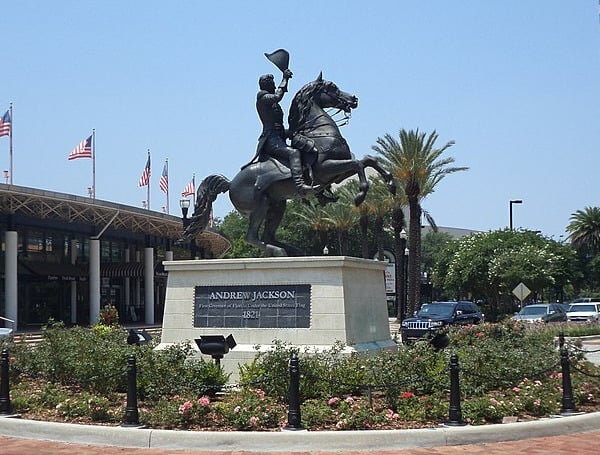An effort to prevent removal of historical monuments and memorials started to advance Monday in the Senate as cities such as Jacksonville fight over Confederate statues.
The Republican-controlled Government Oversight and Accountability Committee voted 4-2 along party lines to support a bill (SB 1122), filed by Sen. Jonathan Martin, R-Fort Myers, that would prevent local governments from relocating, removing or destroying monuments. It also could lead to civil liability for anyone who takes or damages a monument or memorial on publicly owned land.
“This is not a Confederate bill. It’s an American history bill,” Martin said.
Read: Florida House Looks To Block ‘Cultivated’ Meat
Martin said monuments and memorials are available for people who don’t have time or money to take history in college.
Sen. Tracie Davis, a Jacksonville Democrat who voted against the bill, said statues honoring the Confederacy aren’t about the Civil War, but about “hate” during Reconstruction and “to degrade Black people.”
“This is a thinly veiled, targeted attack against my city and my constituents, especially people that look like me,” Davis said.
The measure comes after numerous controversies in recent years in Florida and other states about removing historic markers, many honoring members of the Confederacy.
In December, Jacksonville Mayor Donna Deegan ordered the removal of a “Women of the Southland” monument that had stood as a tribute to the Confederacy in Springfield Park since 2015.
Read: ID Cards, Insurance Become Part Of Florida Trans Battles
Denise Scott of Jacksonville told the committee Confederate monuments “misrepresent history” and for many are a “painful reminder” of a racist past.
But bill supporter David McCallister of Hillsborough County, representing the Guardians of American History, said the measure is about fighting efforts to erase history.
“Who speaks for the dead? These memorials are the silent speakers,” McCallister said.
The bill would give the governor power to suspend or remove local officials who violate the proposed prohibitions on moving or destroying monuments. Also, people who approve removal or destruction could face paying restoration costs. In some cases, the state would withhold arts, cultural, and historic-preservation funding.
Martin proposed a bill last year that sought to give standing to people to file lawsuits if they believed they had “lost history” or the ability to teach about the past because of monuments being removed or relocated. The bill did not pass.
Parts of this year’s bill would be retroactive to Oct. 1, 2020. It doesn’t mention the Confederacy, but seeks to protect military personnel in “any armed conflict since settlers from other countries came to what is now the United States.”
Read: Biden Admin Relied On Undergrads To Write Its Report On Chinese Communist Threat
The retroactive date was picked for when a statue to Christopher Columbus was removed from the St. Petersburg Pier District, Martin said.
“Going back to 2020 isn’t that far,” Martin said. “There’s still many of those monuments available. However, there is not as many in museums as was promised to be placed in museums. But they’re still around and can be returned.”
The proposal would allow monuments and memorials to be temporarily relocated — up to 12 months — because of nearby construction.
A House version of the bill (HB 395) would direct a bronze sculpture of former Confederate Gen. Edmund Kirby Smith be displayed in Lake County or — if no suitable location is found by July 1, 2025 — anywhere else in the state. The Senate version does not include that requirement.
The Smith statue, which spent nearly a century in the National Statuary Hall Collection in the U.S. Capitol as one of two representatives of Florida, hasn’t been showcased the past few years while it has been in the possession of the Florida Department of State.
Lake County commissioners in 2019 supported an effort by the Lake County Historical Society and Museum to house the statue of Smith at a historic courthouse in Tavares. But commissioners later reversed the decision, saying the anticipated arrival of the Smith likeness in Lake County had created divisions.
Born in St. Augustine, Smith had few ties to Florida after attending West Point. He commanded Confederate forces west of the Mississippi and is considered the last general with a major field force to surrender in the Civil War. He spent his later years as a college professor in Tennessee.
The House bill has not been heard in committees.
Android Users, Click To Download The Tampa Free Press App And Never Miss A Story. Follow Us On Facebook and Twitter. Sign up for our free newsletter.

